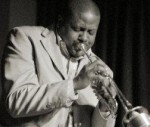Part five of our ongoing dialogues with musicians where we ask the burning question:
When you read music journalism and criticism what qualities are you looking for in the writer and the writing?
This time we hear from trumpeter-bandleader-educator Sean Jones, a busy man these days what with his teaching assignments at Duquesne University in Pittsburgh, his artistic direction of the Cleveland Jazz Orchestra, leading his own band and putting in sideman work here and there. Sean’s latest recording is “No Need For Words” (Mack Avenue). And we travel west to the Bay Area of San Francisco to hear from pianist-bandleader Mark Levine, who in addition to leading his Latin Tinge band is one of the plaintiffs in a landmark lawsuit against the Grammy Awards for their recent draconian decision to summarily eliminate several awards categories – notably for Levine, the former Latin Jazz category – without so much as consulting membership. Mark’s latest recording is “Off & On – The Music of Moacir Santos”.
SEAN JONES

“If I am looking at a journalist’s work, I tend to research their credentials (i.e. music experience). After researching I then do my best to read the review or writing from what could be their perspective based on those credentials. But honestly, I do my best to avoid reviews as they are simply opinions based on one’s personal taste and what they believe is either good or bad.”

MARK LEVINE

“I generally don’t read jazz criticism, unless its a review of a gig or a CD of my own. To me, to quote Woody Allen (I think) “talking about music is like dancing to architecture.
“Jazz journalism is a different subject than criticism, of course. I’m enjoying the new book on Monk, and I’ve enjoyed a few other biographies and autobiographies. I’m still waiting for a good one on Coltrane. I’ve read and re-read the ones on Strayhorn, Mingus, the various ones on Duke, expecially the most recent one. I like biographies when they are written to show the context of their time, which means thoughtful and honest talk about the racism that colored (pardon the pun) the music biz at the time, and still is present in the jazz world, albeit thankfully much less than when I started playing.”

